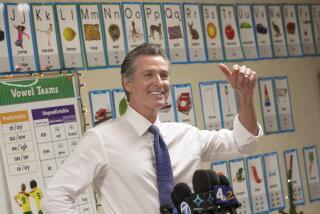Clinton Beats Drum for Science, Math Skills
NORTHBROOK, Ill. — President Clinton, highlighting educational standards as a top priority of his second term, Wednesday called on U.S. schools to raise their proficiency in science and math to the highest levels in the world.
On the first trip of his new term, Clinton chose to visit a school district in suburban Chicago that ranks at the top internationally in science and math, arguing that schools all over the nation should embrace global standards and find out how they rate.
“We have to, in short, commit ourselves for the first time now to have the best education in the world, not just for the few but for the many,” Clinton told a packed gymnasium at Glenbrook North High School. He also said educators and parents should not “be afraid” of tests used to gauge progress toward that goal.
“I do not understand why we are so afraid to do this,” he said. “Don’t we believe in our children more than this?”
Clinton, however, stopped short of calling for mandatory testing before high school diplomas are granted, a heated topic within educational circles.
The administration also disclosed Wednesday that Clinton’s new federal budget would propose sharp increases in spending for charter schools, which are allowed to operate with extra levels of autonomy, and a federal program known as Goals 2000, which provides states with cash that they can use to upgrade their classrooms and train teachers.
Yet Clinton’s trip, coming just two days after his inauguration, was more than a pitch for progress in education, an area in which the federal government has traditionally played only a limited role.
It also underscored his vision of the presidency in his second term, one in which Clinton will try more than ever to exploit the White House bully pulpit as a way to get things done in an era of tight federal spending and divided government.
“We won’t be oriented all the time on just what is happening in Congress or what is happening on legislation,” said White House Press Secretary Mike McCurry. Wednesday’s trip, he added, had “very little to do with action by the federal government or by the Congress.”
In coming weeks, aides said, the president plans to travel outside Washington frequently to push his ideas on such issues as balancing the budget and fine-tuning the welfare reform bill enacted last year.
In his call Wednesday for “national standards, not federal standards,” inside the classroom--standards that ultimately would be adopted at the local level--Clinton trod onto murky terrain. He said that pushing in that direction was the “most important thing we can do.” But acknowledging the subject’s controversial nature, he said it was something that a president only can “get out here and beat the drum for.”
Opponents of national standards frequently invoke fears of losing local control of their schools, the president noted. He retorted that such an argument is “just an excuse to avoid being held accountable because we’re afraid we can’t make it. And it’s selling our kids down the drain and it’s wrong.”
In his new book, “Behind the Oval Office,” former Clinton campaign consultant Dick Morris said that the president strongly believes in the notion of mandatory state testing for high school diplomas but chose to “cop out,” rather than push for such testing, after concluding that “there wasn’t the base of public support.”
McCurry on Wednesday declined to comment on the Morris account.
Wednesday’s trip spotlighted yet another emerging trait of Clinton’s second term: Increasingly, the president wants to use his podium to point out local achievements that may be instructive to the nation, aides said.
Thus, he saluted Glenbrook North High for participating in the third International Math and Science Study, along with other nearby schools that formed a consortium that paid for the administration of the tests used to determine student ranking in the competition.
The consortium’s eighth-graders, generally from middle-class backgrounds, last year tied for first in the world in science and finished second in math among students from 41 countries who took the test. By contrast, a more random sample of U.S. eighth-graders rated above the international average in science but below average in math.
More to Read
Sign up for Essential California
The most important California stories and recommendations in your inbox every morning.
You may occasionally receive promotional content from the Los Angeles Times.










